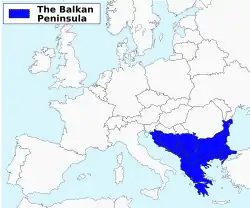Balkans
English

Balkan peninsula (as defined by the Danube-Sava-Kupa line)
Alternative forms
- Balcans (dated)
Etymology
Of Turkic origin; compare Turkish balkan (“wooded mountain range”).[1] Probably unrelated to balk (“ridge of land”).
Proper noun
Balkans
- A geographical region in southeastern Europe, roughly equivalent to the area covered by Albania, Bosnia and Herzegovina, Bulgaria, Croatia, Greece, Kosovo, North Macedonia, Montenegro, Serbia, sometimes including Romania, Slovenia, and European Turkey. [19th c.]
- 2002, Dennis P. Hupchick, The Balkans: From Constantinople to Communism, page 104:
- As the Ottomans' victories in the Balkans multiplied, increasing numbers of Anatolian warriors flocked to their ranks, and their territorial conquests grew.
- 2015, Anastas Vangeli, “On the Growing Cooperation Between China and the Western Balkans”, in Nikolaos Papakostas, Nikolaos Pasamitros, editors, An Agenda for the Western Balkans: From Elite Politics to Social Sustainability, Stuttgart, page 182:
- The Balkans is still comparatively less attractive than other post-communist countries in Europe [...]
Usage notes
- Used with the definite article the and construed as a plural.
Synonyms
- (geographical region): Balkan Peninsula
Derived terms
Related terms
Translations
geographical region in the southeast of Europe — see also Balkan Peninsula
|
References
- Douglas Harper (2001–2024) “Balkans”, in Online Etymology Dictionary.
German
Pronunciation
- IPA(key): /ˈbalkaːns/
Audio (file) - Hyphenation: Bal‧kans
This article is issued from Wiktionary. The text is licensed under Creative Commons - Attribution - Sharealike. Additional terms may apply for the media files.